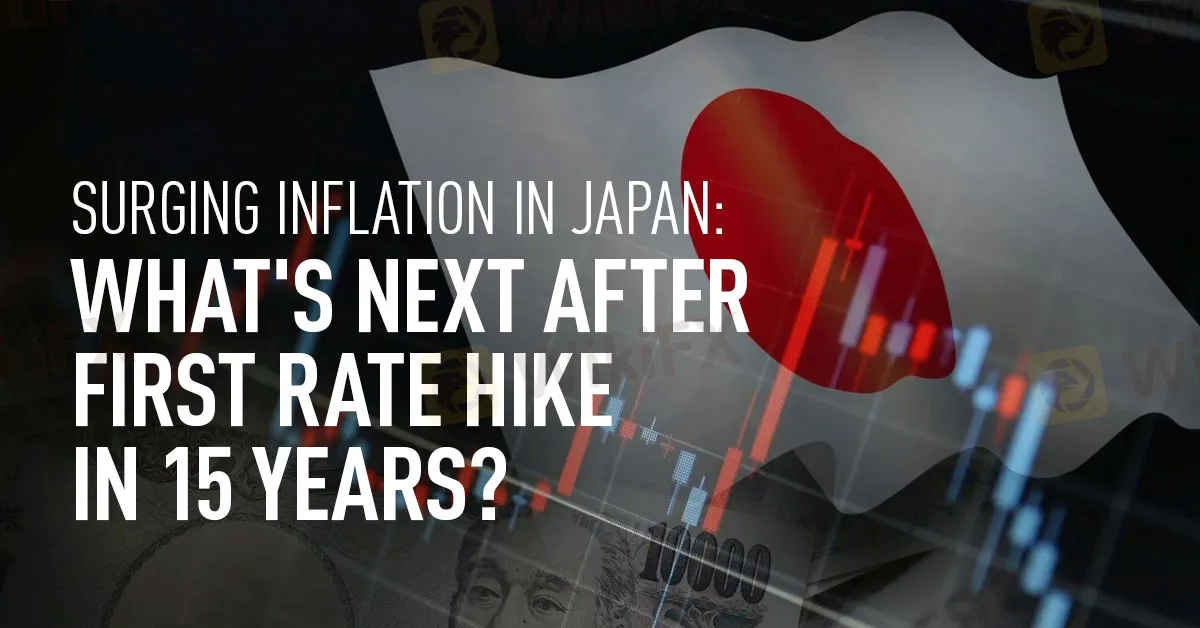简体中文
繁體中文
English
Pусский
日本語
ภาษาไทย
Tiếng Việt
Bahasa Indonesia
Español
हिन्दी
Filippiiniläinen
Français
Deutsch
Português
Türkçe
한국어
العربية
Surging Inflation in Japan: What's Next After First Rate Hike in 15 Years?
Abstract:Consumer inflation in Japan accelerated to its fastest pace in four months, prompting market attention to whether the Bank of Japan might pursue additional interest rate hikes following its first hike since 2007.

Consumer inflation in Japan accelerated to its fastest pace in four months, prompting market attention to whether the Bank of Japan might pursue additional interest rate hikes following its first hike since 2007.
According to the Ministry of Internal Affairs, consumer prices excluding fresh food increased by 2.8% in February compared to a year ago, up from 2% in January, aligning with analysts' forecasts. Similar to previous data for the Tokyo area, much of this growth was attributed to base effects after utility subsidies weighed on prices in 2023.

Following the BOJ's decision to end the negative interest rate, Governor Kazuo Ueda highlighted his close monitoring of service prices, indicating their significance for underlying inflation trends. This observation suggests that changes in service prices, typically occurring at the start of the fiscal year, will be crucial in assessing April's price index.
Ueda explained that the decision to end the negative interest rate was made due to concerns that delaying the move might significantly boost inflationary pressures, potentially necessitating a rapid succession of rate increases. However, he reassured that financial conditions would remain accommodative for the time being, although he acknowledged the possibility of further hikes if inflation risks intensified.
Despite Ueda's remarks, the yen weakened, and Japanese government bond yields fell. Nevertheless, he emphasized the BOJ's readiness to act if upward price risks grew stronger.
Inflation in Japan has proven to be more persistent than initially anticipated, leading the central bank to periodically revise its price growth projections.
Regarding currency intervention, Japanese Finance Minister Shunichi Suzuki stated that it is challenging to speculate on such action when asked about the potential measures to counteract the yen's weakness. This statement came amid expectations of further rate hikes by the Bank of Japan and verbal interventions from Japanese government officials, which provided some support to the yen against the dollar.

Disclaimer:
The views in this article only represent the author's personal views, and do not constitute investment advice on this platform. This platform does not guarantee the accuracy, completeness and timeliness of the information in the article, and will not be liable for any loss caused by the use of or reliance on the information in the article.
Read more

Gold Prices Fluctuate: What Really Determines Their Value?
Gold prices have been fluctuating recently, influenced by multiple factors. Since the beginning of 2025, gold has risen by 11%, hitting new historic highs multiple times in the first quarter.

Investors Beware! A Trillion Naira Wiped Out in a Week
Market takes a hit: a trillion naira wiped out—what happened?

Dollar Under Fire—Is More Decline Ahead?
The dollar faces its biggest decline of the year, strong-dollar logic challenged.

What Impact on Investors as Oil Prices Decline?
Oil prices have come under pressure amid mounting concerns over U.S. import tariffs and rising output from OPEC+ producers. With tariffs on key trading partners and supply increases dampening fuel demand expectations, investor appetite for riskier assets has cooled. This shift in sentiment poses a range of implications for different segments of the investment landscape.
WikiFX Broker
Latest News
Beware: Online Share Buying Scam Costs 2,791,780 PHP in Losses
5 things I wish someone could have told me before I chose a forex broker
Unmasking a RM24 Million Forex Scam in Malaysia
U.S., Germany, and Finland Shut Down Garantex Over Money Laundering Allegations
What Impact on Investors as Oil Prices Decline?
Gold Prices Fluctuate: What Really Determines Their Value?
Dollar Under Fire—Is More Decline Ahead?
Is the North Korea's Lazarus Group the Biggest Crypto Hackers or Scapegoats?
CPT Markets Secures UAE SCA License for FX and CFDs Services
What do Users say about "Titan Capital" on Trustpilot?
Currency Calculator






